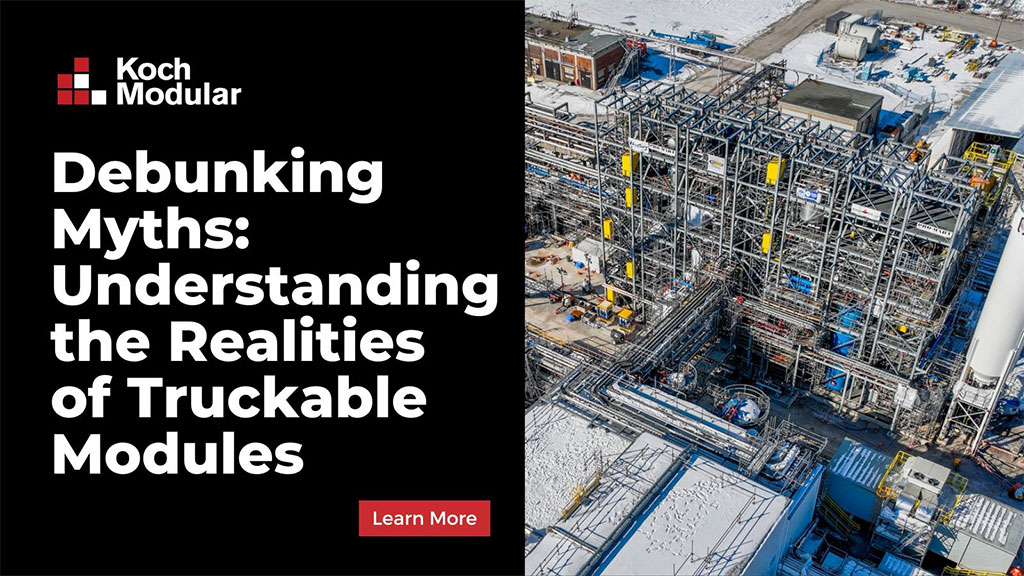Debunking Myths: Understanding the Realities of Truckable Modules
July 2024
/Category:News
As the chemical processing industry evolves, modular construction—particularly horizontally constructed, truckable modules—has emerged as a transformative approach. Despite its growing adoption, several misconceptions about truckable modules and their role in chemical processing facilities persist. This article aims to debunk these myths and provide a clearer understanding of truckable modules' true capabilities and benefits in this specialized field.

1. Size Limitations: Efficiency Beyond Small Spaces
Myth: Truckable modules are too small to be practical for complex chemical processing facilities.
Reality: The misconception that truckable modules are limited to small sizes overlooks the advancements in modular construction. While transportation constraints impose size limitations, truckable modules can be substantial and tailored to fit complex requirements. In the chemical processing industry, these modules can house essential equipment, control rooms, or entire processing units. Designed to maximize internal space while adhering to transportation limits, truckable modules can efficiently accommodate the needs of large-scale chemical operations.
2. Complexity of Assembly: Advanced Systems in Modular Design
Myth: Truckable modules are overly simplistic and lack the complexity required for sophisticated chemical processes.
Reality: The belief that truckable modules are simplistic is an underestimation. Modern modular construction, especially in the chemical processing sector, involves sophisticated engineering and advanced systems integration. Truckable modules can be equipped with intricate piping systems, specialized reactors, and high-tech control panels, all assembled with precision. The off-site fabrication shops where these modules are built allow for meticulous quality control and integration of complex systems, ensuring they meet the demanding requirements for chemical processing.
3. Cost Considerations: Balancing Value and Investment
Myth: Truckable modules are more expensive than traditional construction methods for chemical processing facilities.
Reality: While modular construction may require a modest amount of additional upfront engineering and a small percentage of extra structural steel, these negligible costs are significantly offset by the savings realized from reduced labor hours due to the improved productivity of horizontal modular construction. This does not even account for the indirect cost savings from minimized field construction hours, reduced disruptions to existing operating facilities, and an overall shortened delivery schedule that enables a faster time to market. Therefore, in reality, truckable modules typically deliver an overall cost saving of 20% to 30% compared to traditional stick-built projects.
4. Design Flexibility: Custom Solutions for Specialized Needs
Myth: Truckable modules limit design options for chemical processing facilities.
Reality: On the contrary, truckable modules offer significant design flexibility and are designed to be scalable and repeatable. For smaller projects with limited unit operations, entire process systems can be integrated into a single module. For larger projects with multiple unit operations and increased throughput, systems can be divided into several modules that interconnect at the project site to form a complete unit. Modules can be customized to include specialized equipment, integrate with existing systems, and accommodate unique process requirements. This flexibility enables the creation of efficient and effective processing units that align with the project's goals and regulatory requirements.
Conclusion
Truckable modules represent a significant advancement in modular construction, offering practical solutions and innovative designs for the chemical processing industry. By debunking these common misconceptions, we better understand their true potential and benefits. From size and complexity to cost, quality, and design flexibility, truckable modules provide valuable advantages that enhance the efficiency and effectiveness of chemical processing facilities.
As the chemical processing industry continues to embrace modular construction, overcoming misconceptions and recognizing the strengths of truckable modules will be crucial for unlocking new opportunities and achieving operational excellence. Modular construction is not merely a trend but a strategic approach that can drive efficiency, flexibility, and innovation in the chemical processing sector.

Chat with Mauricio
Mauricio Villegas is the Manager of Business Development at Koch Modular Process Systems. He has over 25 years of experience in the engineering and construction industry, delivering projects across sectors ranging from small brownfield projects to greenfield mega-projects. Before joining Koch Modular, he held various management roles at WorleyParsons, Technip, IHI E&C, and Arcadis. Mr. Villegas earned a BS in Business Administration and Management from Northeastern University.
Mauricio Villegas, Koch Modular Business Development Manager